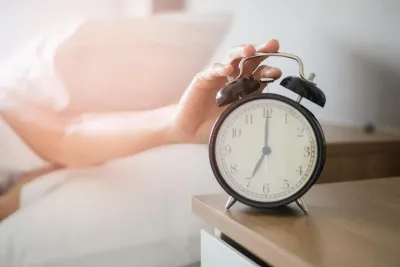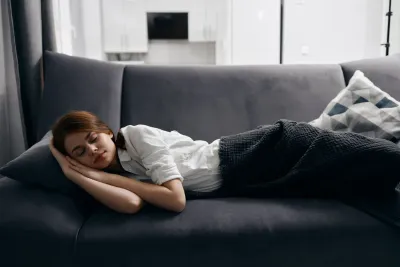Is Hitting the Snooze Button Bad for You? Understanding the Effects
Ana Marie Schick: Resident Sleep Expert and Certified Health Coach • Sep 12, 2024

Key Takeaways
Hitting the snooze button may feel harmless, but it can interrupt your natural wake process and leave you feeling more tired instead of refreshed.
- Repeatedly using the snooze button disrupts your sleep cycle and increases morning grogginess rather than providing meaningful rest.
- Snoozing intensifies sleep inertia, the foggy and sluggish feeling that makes mornings harder to start.
- Frequent snooze use can confuse your internal body clock, making it harder to wake up naturally over time.
- Using one alarm set for your true wake time or gentle wake methods like gradual light can support smoother mornings.
- Consistent bed and wake times are the most effective long term strategy for feeling alert without relying on the snooze button.
You're fast asleep when that dreadful sound of your alarm interrupts your dreams. It's 6:30 am, and you're thinking about hitting the snooze button, thinking, "I just want a few more minutes of sleep."
It's a common habit, but is it actually doing us any good? The argument over whether hitting the snooze button is bad for you or healthy has been going on for years.
According to a survey, over one in three adults hits the snooze button three times before finally getting up, and more than half in their twenties and early thirties admit to hitting snooze every single morning. [1]
Below, I'll examine the effects of the snooze button and what it does to your sleep quality and health. Is it a harmless way to get a few extra minutes of sleep, or does it disrupt your sleep cycle and leave you feeling more tired than ever?
What Happens When We Hit the Snooze Button
We've all experienced it: that moment when the blaring alarm disrupts our sleep, and we desperately reach for the snooze button to steal a few more precious minutes of rest.
But is snooze bad for you or as harmless as it appears? We'll take a closer look at what actually occurs when you hit the snooze button and why it might not be the ideal way to kick off your day.
Disrupts Your Sleep Cycle
Our sleep is divided into different stages, each with its own unique characteristics. One of the most important stages, known as REM sleep, is crucial for memory consolidation, learning, and emotional regulation.
The majority of your REM sleep is obtained in the second half of your overall sleep.
When you hit the snooze button, you could be jeopardizing valuable time spent in REM sleep. At best, you may be able to fall back asleep and achieve a few minutes of Light sleep, but this is not restorative sleep.
This can leave you feeling groggy, irritable, and less alert throughout the day, a phenomenon known as ‘sleep inertia.’
The Impact of Multiple Alarms
By constantly hitting the snooze button can have a negative impact on your body’s internal clock. Our bodies are designed to follow a natural sleep-wake cycle. The frequent interruptions caused by snoozing, can throw off this rhythm resulting in feeling of disorientation and fatigue.
Ready to Ditch the Groggy Mornings?
Upgrade your sleep game with the Chilipad Dock Pro. Personalized temperature control means deeper sleep—and waking up naturally refreshed (no snooze button needed). Explore the best cooling bed system today and start rising and shining on your terms.
Why We Hit Snooze?
Who hasn’t hit the snooze button one too many times? It’s like our bodies are saying, 'Just a few more minutes!' For people who want more sleep, 57% of people hit the snooze button, while on average, the button gets hit twice before finally getting out of bed.
Our natural sleep drive is powerful, and when an alarm interrupts it, we’re tempted to snuggle back under the covers. Plus, that sudden noise can be a bit jarring, making it harder to shake off the feeling of "sleepiness." No wonder the snooze button is so irresistible, even though we know it’s not the best or healthiest way to start your day.
How Does Snoozing Impact Your Health?
A complex series of hormonal, neurochemical, and brain wave pattern changes guide the progression from one sleep stage to the next.
Our bodies and brains respond by promoting the following:
- Muscle and Bone Growth
- Memory Consolidation
- Relaxation and Stress Relief
- Immune System Function
So, in order to get the required amount of sleep that's restful and restorative, you need to cycle through between 4 and 6 sleep cycles per night. [9] [10]
Dr. Chris Winter, Men's Health sleep advisor and author of The Sleep Solution: Why Your Sleep Is Broken and How to Fix It, advises that repeated slamming of the snooze button causes a number of negative health impacts. [11]
Jumbled Hormones
A perilous domino effect occurs when melatonin (sleep hormone) decreases as cortisol (a wake hormone) is ramped up. As you snooze, these hormones go up and down, causing confusion regarding what's really supposed to be happening.
Other chemicals, such as serotonin and dopamine, get similarly entangled in the misinformation. This includes dysregulation of an appetite hormone called ghrelin, which messes up your hunger cues.
Sleep Drunkenness
This happens when cognitive processes aren't quite put into full gear. People get disoriented more easily and have trouble making logical decisions. Dr. Winter emphasizes that it's similar to actually being drunk.

How to Stop Hitting Snooze
If hitting snooze feels automatic every morning, it might be time to switch things up. Try moving your alarm across the room or using softer wake-up sounds to ease into the day. Even small changes can reset your routine.
Read our blog on how to stop snoozing for science-backed tips to wake up refreshed—no endless alarms required.
Wrapping It Up
Occasionally, hitting the snooze isn’t always a bad idea. Like any other tool or piece of equipment, you'll have to use it wisely.
Be kind to your body (and mind), and it will reward you.
The best thing you can do for yourself and your family is to make sleep a priority. And waking up feeling refreshed. Research has shown definitively that those who get high-quality sleep reap unending benefits in physical, medical, cognitive, and mental health. Besides, it’s more fun to go through life awake!
Frequently Asked Questions About Hitting the Snooze Button
Is It Better to Hit Snooze or Get Up?
It's better to get up instead of hitting snooze. Snoozing can disrupt your sleep cycle, leaving you feeling more tired and groggy. Getting up right away helps you start your day with more energy.
Why Does Snoozing Feel So Good?
Hitting the snooze button feels good because our bodies crave sleep and sudden awakenings can be jarring. It's like our bodies are saying, "Just a few more minutes!"
Can Snoozing Lead to Sleep Deprivation?
Yes, snoozing can lead to sleep deprivation. When you hit snooze, you're disrupting your sleep cycle. This can make it harder to fall back asleep and can leave you feeling groggy and tired throughout the day.
What Are Some Tips for Getting Up Earlier?
Try the following tips and see which works best for you.
- Set a consistent sleep schedule
- Create a relaxing bedtime routine
- Avoid screens before sleep
- Limit caffeine and alcohol
- Expose yourself to sunlight in the morning
- Use a sunrise alarm clock
- Avoid naps, especially late in the day
Peer-Reviewed Research References
-
Sleep Junkie.
Sound the Alarm: The Tones and Trends of Waking Up.
Sleep Junkie, February 27, 2017.
Study Type: Consumer Sleep Behavior Analysis
Key Finding: Alarm tone choice and wake-up habits significantly influence morning alertness, stress levels, and overall sleep satisfaction, with harsher alarms linked to more grogginess and negative mood upon waking.
View Resource
Source URL: https://www.sleepjunkie.com/sound-the-alarm-the-tones-and-trends-of-waking-up/
-
McCallum, K.
Does Hitting the Snooze Button Help or Hurt?
Houston Methodist, December 15, 2021.
Study Type: Medical Education Resource
Key Finding: Repeatedly hitting the snooze button can fragment sleep, increase morning grogginess, and interfere with the body’s natural wake-up hormone response.
View Resource
Source URL: https://www.houstonmethodist.org/blog/articles/2021/dec/does-hitting-the-snooze-button-help-or-hurt/
-
Cleveland Clinic.
Sleep: How Much You Need and Its 4 Stages.
Cleveland Clinic, December 3, 2021.
Study Type: Clinical Sleep Education Resource
Key Finding: Healthy sleep requires progressing through all sleep stages; repeated awakenings—such as those caused by snoozing alarms—can disrupt REM and deep sleep cycles.
View Resource
Source URL: https://health.clevelandclinic.org/your-complete-guide-to-sleep/
-
Net, S.
How to Sleep: Hitting Snooze Could Have Negative Health Effects, Warns Study.
Express, August 29, 2022.
Study Type: Health News Summary
Key Finding: Snoozing may elevate cortisol levels, triggering a stress response that can leave individuals feeling more tired and less focused after waking.
View Resource
Source URL: https://www.express.co.uk/life-style/health/1661894/how-to-sleep-hitting-snooze-cortisol
-
Rosman, K. D.
The Power of Restful Sleep and How to Get Some.
Mental Health Matters, 2018.
Study Type: Mental Health & Sleep Education Resource
Key Finding: Consistent, uninterrupted sleep supports emotional regulation, cognitive performance, and physical recovery, while fragmented sleep undermines these benefits.
View Resource
Source URL: https://sadag.org/images/pdf/The-Power-of-Restful-Sleep-An-How-to-Get-Some.pdf
-
Millard, E.
5 Ways Hitting the Snooze Button Is Wrecking Your Body.
Men’s Health, January 11, 2018.
Study Type: Health & Wellness Editorial
Key Finding: Habitual snoozing is associated with increased sleep inertia, hormonal disruption, and difficulty transitioning into full alertness in the morning.
View Resource
Source URL: https://www.menshealth.com/health/a19546442/snooze-button-sleep-problems/









